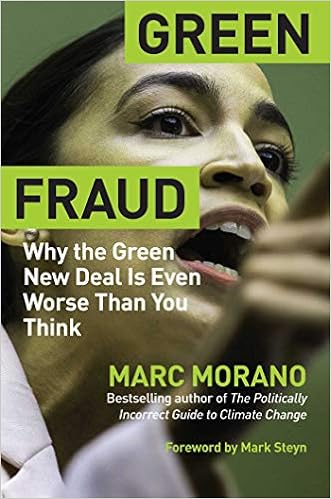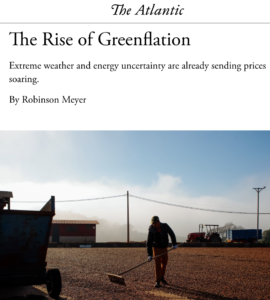Extreme weather and energy uncertainty are already sending prices soaring.…
Over the past year, U.S. consumer prices have risen 7 percent, their fastest rate in nearly four decades, frustrating households and tanking President Joe Biden’s approval rating. And no wonder. High inflation corrodes the basic machinery of the economy, unsettling consumers, troubling companies, and preventing everyone from making sturdy plans for the future.
…
For years, scientists and economists have warned that climate change could cause massive shortages of major commodities, such as wine, chocolate, and cereals. Financial regulators have cautioned against a “disorderly transition,” in which the world commits only haphazardly to leaving fossil fuels, so it does not invest enough in their zero-carbon replacements. In an economy as prosperous and powerful as America’s, those problems are likely to show up—at least at first—not as empty grocery shelves or bankrupt gas stations but as price increases.
That phenomenon, long hypothesized, may be starting to actually arrive. Over the past year, unprecedented weather disasters have caused the price of key commodities to spike, and a volatile oil-and-gas market has allowed Russia and Saudi Arabia to exert geopolitical force.
…
“The lumber-price story is a climate story,” he said. If a series of climate-change-aggravated disasters—including a multiyear outbreak of bark-eating beetles, back-to-back record-breaking fire seasons, and a massive November flood that washed out rail lines—had not struck British Columbia, “sawmills would be able to treat this market just like they did in 2006,” he said.
…
“There are people who say, ‘Climate change isn’t affecting me,’” Janice Cooke, a forest-industry veteran at the University of Alberta, told me last year. “But they’re going to go to the hardware store and say, ‘Holy cow, the price of lumber has gone up.’” Taken by itself, climate change’s role in driving lumber inflation would be a fluke. But worrying signs have started to appear that these dynamics are not limited to lumber. Both climate change itself and the inevitable policy response to it—the global energy transition to low-carbon fuels—are starting to drive up prices around the world. And the world may not have the right tools to deal with it.
….
Over the past year, unprecedented weather disasters have caused the price of key commodities to spike, and a volatile oil-and-gas market has allowed Russia and Saudi Arabia to exert geopolitical force. “This climate-change risk to the supply chain—it’s actually real. It is happening now,” Mohamed Kande, the U.S. and global advisory leader at the accounting firm PwC, told me. … The economy shows evidence of a new, more inflationary regime caused not only by climate change but by the fight over how to respond to it. …
In Canada, the worst single-year drought since 1961 doubled pea prices, sending them to an all-time high. France’s water-logged and record-breakingly hot summer also helped push up global pea prices. (Alternative-meat products have made peas more in demand than ever.) In Germany and Belgium, days of torrential flooding killed more than 200 people and severely damaged the potato crop, contributing to last year’s price increase of 180 percent. (Climate change helped make the rainfall that caused those floods more likely, according to the World Weather Attribution initiative.)
…
“Raising rates,” he said, “doesn’t grow more trees.” Nor does it grow more coffee, end a drought, or bring certainty to the energy transition. And if our new era of climate-driven inflation takes hold, America will need more than higher interest rates to bring balance to supply and demand.
Robinson Meyer is a staff writer at The Atlantic. He is the author of the newsletter The Weekly Planet, and a co-founder of the COVID Tracking Project at The Atlantic.…
#
Climate Depot reality check: The weather is not more extreme and “climate change” is not driving inflation.
2021 State Of The Climate Report: It was not a good year for the climate narrative

Excerpt from Green Fraud: Roger Pielke Jr. of the University of Colorado testified to Congress there was simply “‘no evidence’ that hurricanes, floods, droughts, tornadoes are increasing.”
A 2020 study by Pielke published in the journal Environmental Hazards found that the “evidence signal of human-caused climate change in the form of increased global economic losses from more frequent or more intense weather extremes has not yet been detected.”
On nearly every metric, extreme weather is on either no trend or a declining trend on climate timescales. Even the UN IPCC admitted in a 2018 special report that extreme weather events have not increased. The IPCC’s special report found that “there is only low confidence regarding changes in global tropical cyclone numbers under global warming over the last four decades.”56 The IPCC report also concluded “low confidence in the sign of drought trends since 1950 at global scale.”
Pielke testified to Congress on the current state of weather extremes, “It is misleading, and just plain incorrect, to claim that disasters associated with hurricanes, tornadoes, floods, or droughts have increased on climate timescales either in the United States or globally.”
Related:
TIME Mag: ‘If the U.S. Wants to Fully Tackle Inflation, It Needs to Tackle Climate Change’
New Study Finds No Evidence Of Global Warming Increasing Extreme Rainfall
1000 year rainfall study suggests droughts and floods used to be longer, worse
Study: No Difference Between 20th-century Rainfall Patterns and Those in the Pre-Industrial Era
Analysis: Record Rainfalls A Thing Of The Past:
At least they got the 'Greenflation' part right. https://t.co/GmRD5PHJJ0
— Joseph Toomey (@JosephEToomey) February 3, 2022



